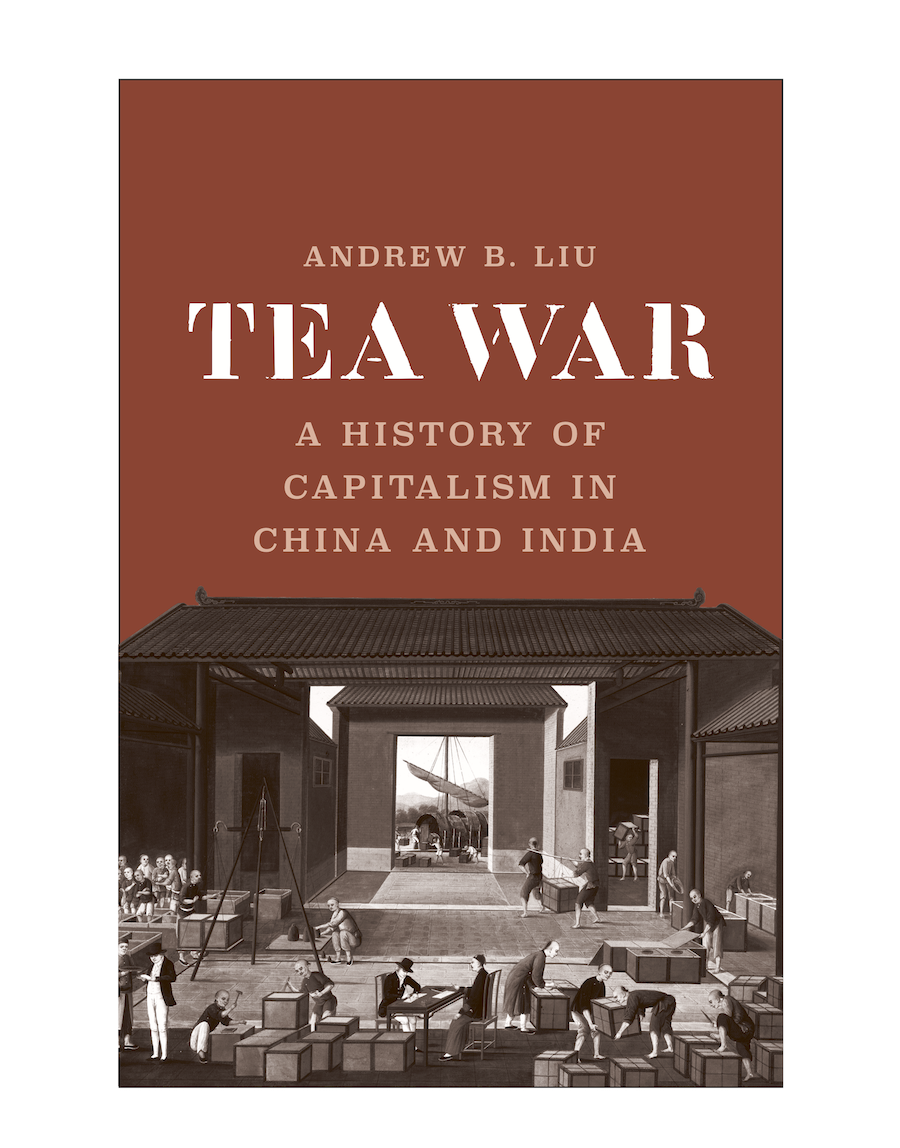Tea War: a history of capitalism in China and India
My book was published in spring 2020. The official description:
Tea remains the world’s most popular commercial drink today, and at the turn of the twentieth century, it represented the largest export industry of both China and colonial India. In analyzing the global competition between Chinese and Indian tea, Andrew B. Liu challenges past economic histories premised on the technical “divergence” between the West and the Rest, arguing instead that seemingly traditional technologies and practices were central to modern capital accumulation across Asia.
He shows how competitive pressures compelled Chinese merchants to adopt abstract industrial conceptions of time, while colonial planters in India pushed for labor indenture laws to support factory-style tea plantations. Characterizations of China and India as premodern backwaters, he explains, were themselves the historical result of new notions of political economy adopted by Chinese and Indian nationalists, who discovered that these abstract ideas corresponded to concrete social changes in their local surroundings.
Together, these stories point toward a more flexible and globally oriented conceptualization of the history of capitalism in China and India.
I envisioned this book as an intervention into debates over the history of capitalism — both old and new yet almost always centered on the north Atlantic — and also into debates over the economic comparability of Europe and Asia, aka, “the great divergence” debates. For more on this, I have a longer essay expanding on these ideas in the Journal of Asian Studies (2019).
The book itself is the product of multi-sited, comparative research, using archival materials from China, India, the UK, and Taiwan, written in Chinese, Bengali, and Japanese (and uh English).
My conceptualization of the argument also drew upon an ongoing effort to reimagine the historical dynamics of capitalism, in particular, a rereading of Karl Marx’s mature critique of political economy for the contemporary world. On this, see my piece in Spectre, if you’re into that sort of thing!
There’s also, of course, a lot about tea, probably more than I ever needed to know. There are some funny stories of British people saying racist things, some Bengali plays and fiction, Qing officials trying to explain Adam Smith (without being able to read English), and some interesting discoveries about incense sticks and Chinese labor.
If any of this sounds interesting, you can check out the introduction here.
I liked Yueran Zhang’s review below.
Tea War was the recipient of the 2022 Ralph Gomory prize from the Business History Conference, which “recognizes historical work on the effects of business enterprises on the economic conditions of the countries in which they operate.”
It was also long-listed for the International Convention of Asian Scholars (ICAS) 2021 book prize for best work in the humanities in English.
ways to get it
- on the Yale University Press site
discount code: YAB99 for 25% off
- also available on JSTOR for readers with institutional subscriptions
- obligatory link to Bookshop.org
some nice reviews
“Capitalism is not a ‘Free Labor’ System”
Jacobin Magazine
by Yueran Zhang
January 10, 2021
Chinese version:
“中国与印度的早期茶叶贸易:资本主义的“自由劳动”体系迷思”
澎湃新闻
by 张跃然
February 15, 2021
“A fascinating history of the conduct and impact of the tea trade”
The Economist
by Jeffrey Wasserstrom
July 24, 2020
“Chai Capitalism”
New Rambler Review
by Kelvin Ng
December 10, 2020
“Storm in a Teacup”
The Baffler
by Francis Wade
July 16, 2020
“Rumo ao fundo do poço” (“Towards Rock Bottom”)
Dystopia
by Fernando Pureza
April 2021
Review in Journal of Agrarian Change
by Jairus Banaji
March 2021
“Reviews of ‘Beyond Pan-Asianism: Connecting China and India, 1840s-1960s’, and ‘Tea-War: A History of Capitalism in China and India’: India’s forgotten China links”
The Hindu
by Ananth Krishnan
May 8, 2021
short features by me
“Tea and capitalism: The China tea trade was a paradox – a global, intensified industry without the usual spectacle of factories and technology”
Aeon Magazine
May 19, 2020
“Notes Toward a More Global History of Capitalism: reading Marx’s Capital in India and China”
Spectre
July 6, 2020
interviews
“Histories of Capitalism and Race in the Middle East and Indian Ocean” seminar series
Walter Rodney Collective for Historical Research, SOAS, University of London
December 8, 2022
Blue and White: Columbia’s Undergraduate Magazine
with Claire Shang
September 23, 2021
Guerrilla History
with Henry Hakamaki, Adnan Husain, and Breht O’Shea
June 18, 2021
“In Theory”: podcast for the Journal of Intellectual History
with Simon Brown
March 10, 2021
The New Books Network
with Lukas Rieppel
November 4, 2020
The India China Institute, the New School
with Mark Frazier
May 23, 2020
The Weatherhead East Asia Institute, Columbia University
April 22, 2020
Long US-China Institute, UC-Irvine
with Emily Baum
April 27, 2020
Lekh Review podcast
with Karthik Nachiappan
July 1, 2020
Brown History podcast
with Ahsun Zafar
September 26, 2020
Counterpoint with Amanda Vanstone
Australian Broadcasting Corporation
January 11, 2021
mentions and lists
“Diversify and Decolonise your Economics Reading List: Fall 2020”
D-Econ blog
September 19, 2020
“2020 China Books: China and the World”
China Channel, Los Angeles Review of Books
June 7, 2020
“Making Sense of the Multipolar World”
The Wire China
May 10, 2020
